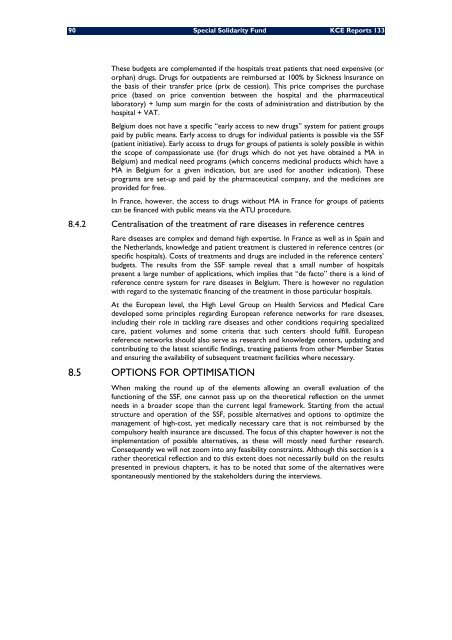Optimalisatie van de werkingsprocessen van het Bijzonder ... - KCE
Optimalisatie van de werkingsprocessen van het Bijzonder ... - KCE
Optimalisatie van de werkingsprocessen van het Bijzonder ... - KCE
You also want an ePaper? Increase the reach of your titles
YUMPU automatically turns print PDFs into web optimized ePapers that Google loves.
90 Special Solidarity Fund <strong>KCE</strong> Reports 133<br />
These budgets are complemented if the hospitals treat patients that need expensive (or<br />
orphan) drugs. Drugs for outpatients are reimbursed at 100% by Sickness Insurance on<br />
the basis of their transfer price (prix <strong>de</strong> cession). This price comprises the purchase<br />
price (based on price convention between the hospital and the pharmaceutical<br />
laboratory) + lump sum margin for the costs of administration and distribution by the<br />
hospital + VAT.<br />
Belgium does not have a specific “early access to new drugs” system for patient groups<br />
paid by public means. Early access to drugs for individual patients is possible via the SSF<br />
(patient initiative). Early access to drugs for groups of patients is solely possible in within<br />
the scope of compassionate use (for drugs which do not yet have obtained a MA in<br />
Belgium) and medical need programs (which concerns medicinal products which have a<br />
MA in Belgium for a given indication, but are used for another indication). These<br />
programs are set-up and paid by the pharmaceutical company, and the medicines are<br />
provi<strong>de</strong>d for free.<br />
In France, however, the access to drugs without MA in France for groups of patients<br />
can be financed with public means via the ATU procedure.<br />
8.4.2 Centralisation of the treatment of rare diseases in reference centres<br />
Rare diseases are complex and <strong>de</strong>mand high expertise. In France as well as in Spain and<br />
the Netherlands, knowledge and patient treatment is clustered in reference centres (or<br />
specific hospitals). Costs of treatments and drugs are inclu<strong>de</strong>d in the reference centers’<br />
budgets. The results from the SSF sample reveal that a small number of hospitals<br />
present a large number of applications, which implies that “<strong>de</strong> facto” there is a kind of<br />
reference centre system for rare diseases in Belgium. There is however no regulation<br />
with regard to the systematic financing of the treatment in those particular hospitals.<br />
At the European level, the High Level Group on Health Services and Medical Care<br />
<strong>de</strong>veloped some principles regarding European reference networks for rare diseases,<br />
including their role in tackling rare diseases and other conditions requiring specialized<br />
care, patient volumes and some criteria that such centers should fulfill. European<br />
reference networks should also serve as research and knowledge centers, updating and<br />
contributing to the latest scientific findings, treating patients from other Member States<br />
and ensuring the availability of subsequent treatment facilities where necessary.<br />
8.5 OPTIONS FOR OPTIMISATION<br />
When making the round up of the elements allowing an overall evaluation of the<br />
functioning of the SSF, one cannot pass up on the theoretical reflection on the unmet<br />
needs in a broa<strong>de</strong>r scope than the current legal framework. Starting from the actual<br />
structure and operation of the SSF, possible alternatives and options to optimize the<br />
management of high-cost, yet medically necessary care that is not reimbursed by the<br />
compulsory health insurance are discussed. The focus of this chapter however is not the<br />
implementation of possible alternatives, as these will mostly need further research.<br />
Consequently we will not zoom into any feasibility constraints. Although this section is a<br />
rather theoretical reflection and to this extent does not necessarily build on the results<br />
presented in previous chapters, it has to be noted that some of the alternatives were<br />
spontaneously mentioned by the stakehol<strong>de</strong>rs during the interviews.

















